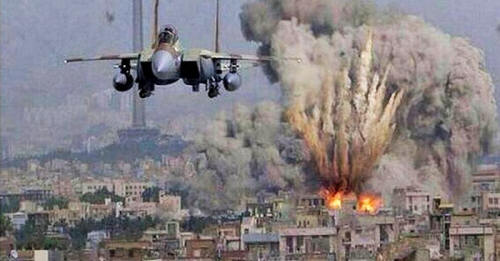|

by Claire Bernish
June 09, 2016
from
TheAntiMedia Website

A troubling report by the Institute for Economics and Peace (IEP)
found a mere ten nations on the planet are not at war and completely
free from conflict.
According to the
Global Peace Index 2016, only,
-
Botswana
-
Chile
-
Costa Rica
-
Japan
-
Mauritius
-
Panama
-
Qatar
-
Switzerland
-
Uruguay
-
Vietnam,
...are free from conflict.
Iceland
tops the list of most peaceful
countries in the world, followed by,
-
Denmark
-
Austria
-
New Zealand
-
Portugal
-
Czech Republic
-
Switzerland
-
Canada
-
Japan
-
Slovenia,
...while the United States ranked far
lower, at 103. Palestine, placed in the index of 163 nations for the
first time this year, ranked 148th.
War-torn Syria placed at the bottom of the list, lower than only,
-
South Sudan
-
Iraq
-
Afghanistan
-
Somalia
-
Yemen
-
Central African Republic
-
Ukraine
-
Sudan
-
Libya
"The index gauges global peace using
three broad themes:
-
the level of safety and
security in society
-
the extent of domestic or
international conflict
-
the degree of
militarization,",
...the report states.
Though 81 countries improved their level
of peace according to those criteria, those gains were muddied by
deteriorating peace in 79 other nations.
In the last decade,
"the average country score
deteriorated by 2.44 per cent with 77 countries improving while
85 countries deteriorated, highlighting the global complexities
of peace and its uneven distribution."
While
Central and South America continue
to earn the worst marks for societal safety and security,
the U.S. represents one of the only exceptions due to its,
"excessive incarceration rate."
Overall, Europe held its
spot as the most generally peaceful
region, while the Middle East and North Africa region (MENA) remains
consistently the most tumultuous on the planet.
"The historic 10-year deterioration
in peace has largely been driven by the intensifying conflicts
in the MENA region," the report notes.
"Terrorism is also at an all-time
high, battle deaths from conflict are at a 25-year high, and the
number of refugees and displaced people are at a level not seen
in 60 years."
"Notably, the sources for these three dynamics are intertwined
and driven by a small number of countries, demonstrating the
global repercussions of breakdowns in peacefulness."
According to the report, the United
States spends an outrageously high percentage of the globe's
military expenditures - 38 percent - while the next largest military
spender, China, accounted for considerably less, 10 percent of the
global share.
In the score of militarization, the
least peaceful countries include,
-
Israel
-
Russia
-
North Korea
-
Syria
-
the U.S.
Of particular note in this year's tenth
anniversary index - the most comprehensive to date -
globalization of conflict, in
repercussions such as the growing refugee crisis, is driving a
growing disparity between the least and most peaceful nations.
In fact, the,
"number of refugees and displaced
persons increased dramatically over the decade, doubling from
2007 to 2015, to approximately 60 million people.
There are nine countries with more
than 10 per cent of their population classified as refugees or
displaced persons with Somalia and South Sudan having more than
20 per cent of their population displaced and Syria with over 60
per cent displaced."
While actual terrorist activity most
heavily
impacts,
-
Syria
-
Iraq
-
Nigeria
-
Afghanistan
-
Pakistan,
...its ripples spread worldwide.
"Many countries are at record high
levels of peacefulness, while the bottom 20 countries have
progressively become much less peaceful, creating increased
levels of inequality in global peace," according to the report.
As the world descends into a far less
peaceful state overall, the staggering cost of militarism and
violence becomes painfully clear - 13.3 percent of the globe's total
economic activity, $13.6 trillion in purchasing power parity,
concerned violent conflict.
That's the equivalent of,
"$1,876 for every person in the
world."
Working toward peace will require the
international community to promote peaceful, just, and inclusive
societies, the IEP urged in conclusion, though such goals aren't
expected to be reached quickly or easily.
|


